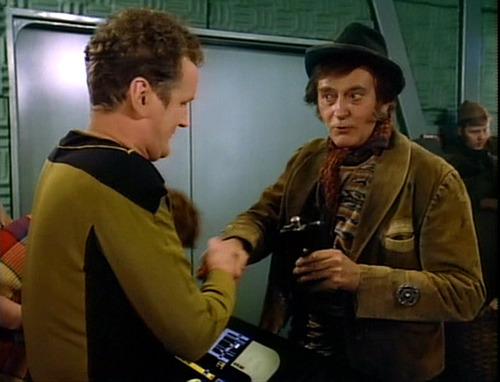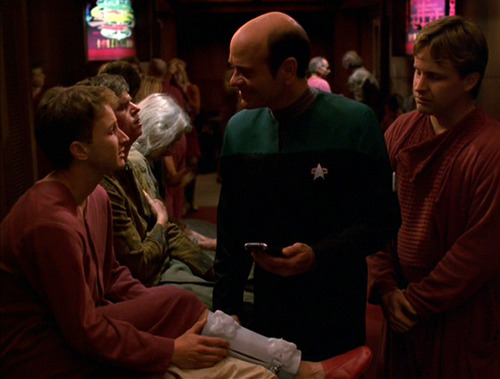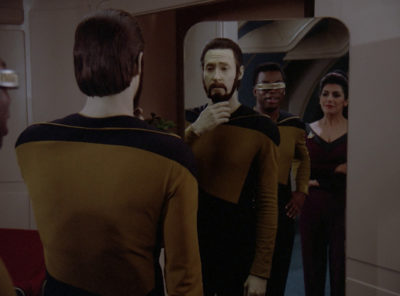If I had never seen “Up the Long Ladder” and you told me there was a TNG episode that tried to make a case for immigration reform, that had Riker making pro-choice statements, that was written by Melinda M. Snodgrass, and that included miniature goats, I’d probably be super excited to see it.
But all the miniature goats and reproductive justice rhetoric in the galaxy can’t save the unmitigated mess that is “Up the Long Ladder”.
To start, the Enterprise discovers an old distress call coming from a colony in a sector thought uncolonized. There they discover a group called the Bringloidi – basically stereotyped-to-the-point-of-caricature Irish people whose ancestors left Earth looking for a return to a simpler life. As if their accents and the leader’s uncanny resemblance to a leprechaun weren’t enough to clue us in, their appearance on the Enterprise is accompanied by cheezy Irish folk music.
Their leader, Danilo, immediately notes how great it is to see another Irishman, and offers O’Brien a sip from his hip flask, because stereotypes. Not long after the crew gets the Bringloidi and their animals (mini goats!) settled in a cargo bay, we meet Danilo’s hot-tempered daughter Brenna. Danilo tries to marry her off to Picard, who is having none of it.
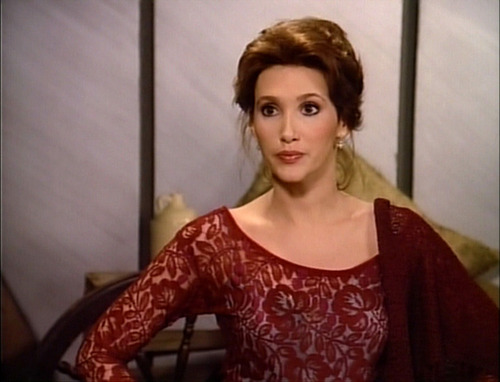
But Brenna immediately impresses Riker with her beauty and confidence, and later on, with her sassy crop top sweater. She talks herself into his quarters on the pretence of needing to wash her feet.
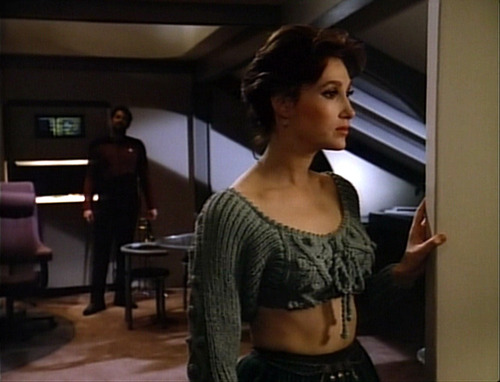
Riker: I can see why your father wants to marry you off.
Brenna: Oh, and why is that?
Riker: So he can have a pipe and mug of beer in peace.
Oh Riker, you’re so witty. It’s so funny and so like a woman that she’s annoyed with her dad, even if he is totally sloshed half the time and leaves her to basically run the colony without getting any credit.

Oh right, I need to go back: before they even get the Bringloidi on board, Worf comes down with the Klingon equivalent of the measles. Pulaski treats him, and lies for him to protect him from the humiliation of having a kids’ disease. Not long after, Worf asks her to partake in a Klingon tea ceremony as thanks. The tea is poisonous but she inoculates herself so she can participate.
And then it is never mentioned again for the rest of the episode. The only point these couple of scenes serve is potentially to try to shore up Dr. Pulaski’s reputation with the viewers. I actually really appreciate that and I think it would work if it had anything to do with the overall story or at least wasn’t so easily resolved in the first few minutes of the episode.
Anyhow, back to the Bringloidi situation. Before Riker “washes Brenna’s feet”, Danilo tells Picard there was another group of colonists that travelled with their ancestors to a nearby planet to settle.
A bit later, Worf helps Danilo replicate liquor, which seems to be Danilo’s primary concern, because more stereotypes. Brenna, back from her sexy foot bath, tells off the men, including Worf, because gender combined with ethnic stereotypes.
But hey, the Enterprise has tracked down the other colony. The Mariposans, it turns out, are a planet made up of clones of the five survivors of the original colony shipwreck. Unfortunately, they need new DNA to continue their survival.
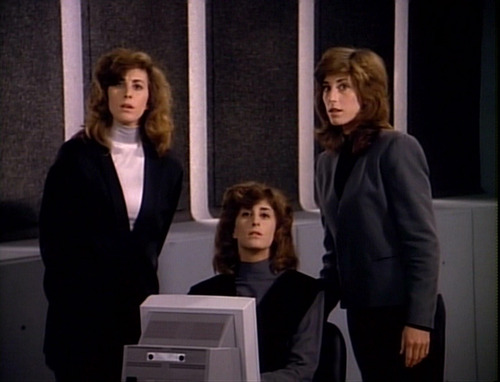
When the Mariposan leader asks that humans on the Enterprise donate their DNA to be cloned, Riker shuts down that idea fast, arguing that creating copies of him would diminish him. The Mariposans then resort to stealing DNA from him and Pulaski. When Riker discovers it, he and Pulaski beam down and destroy the clones.
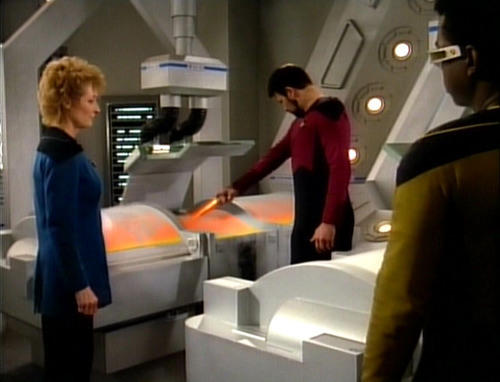
Here’s what Snodgrass says about these scenes [x]:
“I got enormous flack from the right to life coalition because they destroyed the clones. They thought I was condoning abortion. In fact, I did put a line in Riker’s mouth that was very pro-choice and the right to life coalition went crazy. He says I told you that you can’t clone me and you did it against my will, and I have the right to have control over my own body. That’s my feeling and it was soapbox, and it was one I got to get on. I was supported by Maurice [Hurley] all the way.”
I watched the episode and re-read the transcript and I can’t figure out which line Snodgrass is referring to – Riker says he and Pulaski were assaulted and robbed and he denies the Mariposans’ allegations that he’s a “murderer” but he doesn’t talk about the right to control his body. But I do think this part of the plot reads as pro-choice and the scenes with Riker reacting to this issue are the least eye-roll-worthy in the episode.
But it gets worse again. The solution Picard and Pulaski come up with? Move the Bringloidi in with the Mariposans so latter have “breeding stock”.
Pulaski: Thirty couples are enough to create a viable genetic base. But the broader the base the healthier and the safer the society. So it will be best if each woman, Bringloidi and Mariposan, had at least three children by three different men.
Danilo: I think I could handle that, yes.
On the one hand, it’s cool that the Federation is putting science and practicality above monogamous heterosexual family norms. On the other hand, the Federation is sitting at a table while two men shake hands on a deal that will put incredible social pressure on all their female citizens to give birth to at least three children each, by different men.
The ickiness of that fact is not helped at all when Danilo’s first comment after shaking hands is: “Right, now let’s go stake out my three women”.
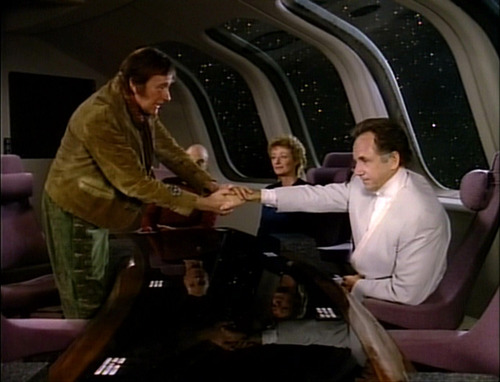
Picard does tell Brenna if she isn’t into it, she can leave the colony (because if you stay you’d better be damn willing to make babies with these clones!) but she’s convinced to stay by his appeal to her loyalty to her father and the other colonists, plus the fact the Mariposan Prime Minister “sounds like he’d have more than two coins to rub together”.
So that’s the episode plot. I talked about the goats and the pro-choice scenes and a bit about Snodgrass as the writer, but what does any of this has to do with immigration? Here’s Snodgrass again [x]:
“It was intended to be a commentary about immigration, because I hate the current American policy. I wanted it to be something that says sometimes those outsiders you think are so smelly and wrong-colored, can bring enormous benefits to your society because they bring life and energy. That’s what I was going for. Now my boss, at the time, was Maury Hurley, who is a major Irishman and leads the Saint Patrick’s Day parade. When I was describing to him what I wanted to do, I was trying to come up with an analogy, and I said it was like a little village of Irish tinkerers, and he loved it so much he made me make them Irish tinkerers. I said okay, and that’s how it came about.”
When I read this my response was less words and more of an agonized, drawn out groan for how poorly the legitimate message got translated.
Snodgrass has said script rewrites and budget cuts meant some of the important commentary got lost, but I think the episode and its message was doomed from the point they decided to make the Bringloidi Irish stereotypes.
If you want to convince people to look beyond racial/ethnic stereotypes and support immigration, the last thing you should do is make the stand-ins for immigrants a group of people based entirely on another set of ethnic stereotypes.
An argument for immigration based purely on what’s in the episode gets you this: “These immigrants that you think are a bunch of dirty, drunken layabouts totally are, but you are also ridiculously desperate, so you’re stuck with them, ha ha! We’re really glad to get rid of them because even though we had a good time laughing at them, they kept setting fires and stinking up the cargo bay with their pigs and admittedly adorable miniature goats. Don’t you feel like you appreciate them and want to include them as your equals now?”
What was written was not conducive to building empathy. To get Snodgrass’ intended message across the Bringloidi needed to be people the audience could see themselves in. They needed to be clearly worthy of the Enterprise crew’s respect, and by extension, the audience’s.
Bechdel-Wallace Test: Fail
Entire Episode: Fail







